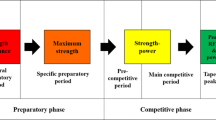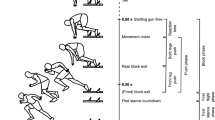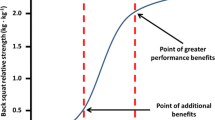Abstract
On the basis of laboratory research on self-regulation, it was hypothesized that positive self-monitoring, more than negative self-monitoring or comparison and control procedures, would improve the bowling averages of unskilled league bowlers (N =60). Conversely, negative self-monitoring was expected to produce the best outcome for relatively skillful league bowlers (N =67). In partial support of these hypotheses, positive self-monitors significantly improved their bowling averages from the 90-game baseline to the 9- to 15-game postintervention assessment (Ximprovement = 11 pins) more than all other groups of low-skilled bowlers; higher skilled bowlers' groups did not change differentially. In conjunction with other findings in cognitive behavior therapy and sports psychology, the implications of these results for delineating the circumstances under which positive self-monitoring facilitates self-regulation are discussed.
Similar content being viewed by others
Reference Note
Barling, J., & Bresgi, I.Cognitive factors in athletic (swimming) performance: A failure to replicate. Manuscript under review, University of Witwatersrand (South Africa), 1980.
References
Kanfer, F. H. The many faces of self-control, or behavior modification changes its focus. In R. B. Stuart (Ed.),Behavioral self-management: Strategies, techniques, and outcomes. New York: Brunner/Mazel, 1977.
Kantorowitz, D. A., Walters, J., & Pezdek, K. Positive versus negative self-monitoring in the self-control of smoking.Journal of Consulting and Clinical Psychology 1978,46 1148–1150.
Kirschenbaum, D. S., & Bale, R. M. Cognitive-behavioral skills in golf: Brain power golf. In R. M. Suinn (Ed.),Psychology in sports: Methods and applications. Minneapolis: Burgess, 1980.
Kirschenbaum, D. S., & Karoly, P. When self-regulation fails: Tests of some preliminary hypotheses.Journal of Consulting and Clinical Psychology 1977,45 1116–1125.
Litrownik, A. J., & Freitas, J. L. Self-monitoring in moderately retarded adolescents: Reactivity and accuracy as a function of valence.Behavior Therapy 1980,11 245–255.
Mahoney, M. J. Cognitive skills and athletic performance. In P. C. Kendall & S. D. Hollon (Eds.),Cognitive-behavioral interventions: Theory, research, and procedures. New York: Academic Press, 1979.
Masters, J. C., & Santrock, J. W. Studies in the self-regulation of behavior: Effects of contingent cognitive and affective events.Developmental Psychology 1976,12 334–348.
McFall, R. M., & Hammen, C. L. Motivation, structure, and self-monitoring: The role of nonspecific factors in smoking reduction.Journal of Consulting and Clinical Psychology 1971,37 80–86.
Meyers, A. W., Cooke, C. J., Cullen, J., & Liles, L. Psychological aspects of athletic competitors: A replication across sports.Cognitive Therapy and Research 1979,3 361–366.
Meyers, A. W., Schleser, R., Cooke, C. J., & Cuvillier, C. Cognitive contributions to the development of gymnastic skills.Cognitive Therapy and Research 1979,3 75–86.
Patterson, C. J., & Mischel, W. Effects of temptation-inhibiting and task-facilitating plans on self-control.Journal of Personality and Social Psychology 1976,33 209–217.
Tomarken, A. J., & Kirschenbaum, D. S. Self-regulatory failure: Accentuate the positive?Journal of Personality and Social Psychology 1982,43 584–597.
Author information
Authors and Affiliations
Rights and permissions
About this article
Cite this article
Kirschenbaum, D.S., Ordman, A.M., Tomarken, A.J. et al. Effects of differential self-monitoring and level of mastery on sports performance: Brain power bowling. Cogn Ther Res 6, 335–341 (1982). https://doi.org/10.1007/BF01173581
Issue Date:
DOI: https://doi.org/10.1007/BF01173581




